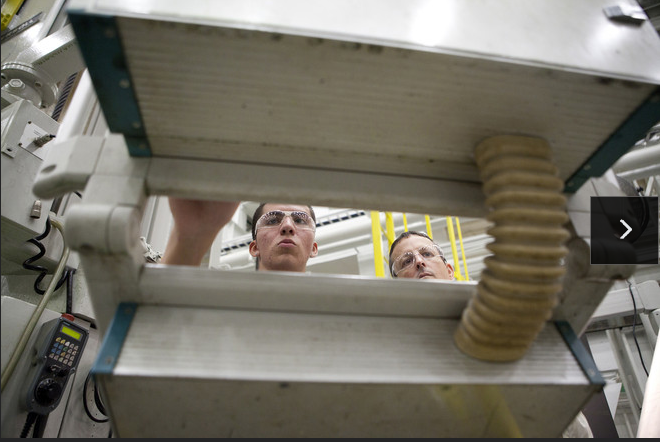 Fascinating WSJ piece from a few days back describing how German companies excel at training up their poorly prepared new workers so well that they're starting to spread their best practices globally. It's basically a revival of classic apprenticeship training, and apparently German firms like VW are so good at it that companies and states and the fed in the US are looking to copy their methods.
Fascinating WSJ piece from a few days back describing how German companies excel at training up their poorly prepared new workers so well that they're starting to spread their best practices globally. It's basically a revival of classic apprenticeship training, and apparently German firms like VW are so good at it that companies and states and the fed in the US are looking to copy their methods.
Why?
There are 600,000 skilled, middle-class manufacturing jobs in the US that are - get this! - currently unfillable.
The VW HR person's blunt statement:
We've learned it is better to build our own workforce instead of just relying on the market.
VW's apprenticeship program runs 3 years.
I've gotten asked such questions about the US education system for years at my briefings all over America. And I've always answered with some variation on the need for companies to both train up poorly prepared workers and reach down into educational systems to do much the same (what if VW oversaw the same sort of thing - for profit - at the right colleges/votec/institutes/etc.?).
But I've never actually come across an MSM article that captured it like this one does.
More:
In Germany, nearly two-thirds of the country's workers are trained through partnerships among companies, technical schools and trade guids. Last year, German companies took on and trained nearly 600,000 paid apprentices
Nice numerical symmetry there - huh?
Story talks also about Charlotte community college that is pursuing the same sort of collaboration with 18 local firms - mostly European. As one German exec put it:
We think we've found the missing link in the education system between high school and starting college.
In the U.S., falling into that gap costs lifetime earnings that are stunning.
This seems like a way of filling in that void.
It's one of those everything-old-is-new-again stories.